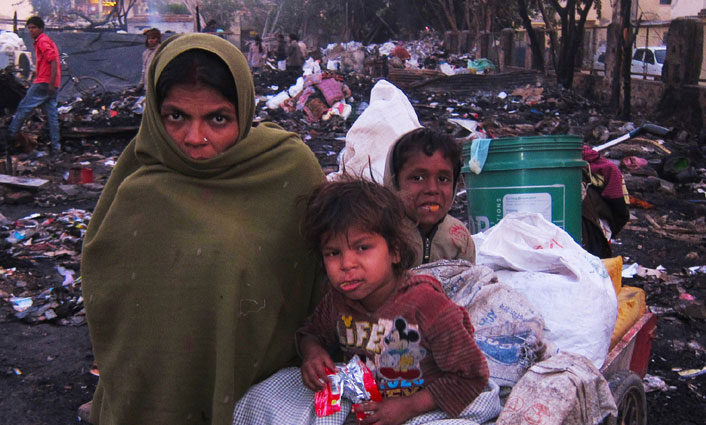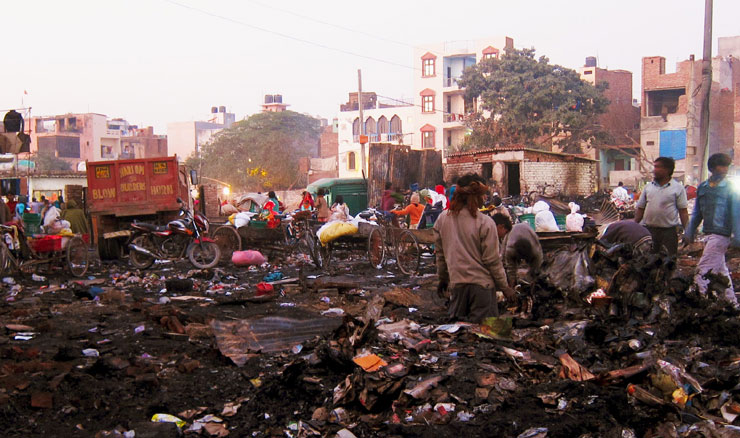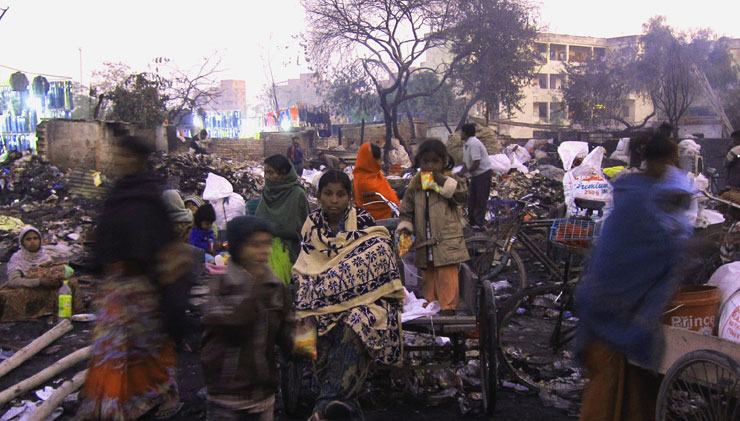Fire In Delhi Slum: A Pyro-Paradise
By Anoo Bhuyan
27 December, 2012
Countercurrents.org

“I was putting the children to sleep. Suddenly we saw that a fire had broken out in our basthi. We had maybe five minutes to gather the children and run to the gate,” says Anitha, recounting her experience of a sudden fire that broke out in her slum last week.
On the evening of 19 December 2012, the kabbadiwallahs of Dasratpuri-Naseerpur slum in south-west Delhi had returned home from a day’s work. Dinner was being made, and they were relaxing, when suddenly at around 9.30pm, flames began to consume their settlement. Their basthi was a pyro-paradise - it was filled with carton boxes and other recyclable materials that they had collected over days from waste piles around Delhi. Around ninety families have lost their homes. There was no loss of life, but there was loss of property.
Waste collection, the subsequent sorting and cleaning and finally selling it, is the mainstay of the residents of this settlement. The settlement is their home-office as they live and work here. The cartons, paper, plastic, tin and other materials had been gathered in large piles. This caught fire easily and the flames licked it all up, bringing the entire place to ashes. Many have also lost the rickshaws on which they ferry the waste they collect. “I only have what Im wearing on my back right now,” says Ram Babu, 30, who is one of the residents. The residents estimate that they have lost anything between 15 to 30 lakhs, in terms of the scrap they were to sell.
Many of these residents said that they are migrants who come from states like Bihar. They are also nomads in the sense that they have shifted from slum to slum several times, as their previous homes have been demolished. Currently, they are sleeping in a nearby public park and the local councillor has provided a marriage hall some distance away for them to sleep at. “We can’t find another place to live. It is difficult to do all this when we have children and when we have some of our belongings here. Its very cold now but we have to sleep outdoors,”says Ram Babu.

Some of the residents of the surrounding township as well as NGOs have started sending these workers food and clothes. And yet there are others who say that “There is badboo- bad smell- coming from this area,” explains Ram Babu while talking about the slum’s neighbours. While most people have not bothered these workers, some of them have directly shouted at the residents of the slum, about how it is a nuisance to the area and must be removed. One house owner in a nearby apartment voices his irritation and says, “They play a lot of loud music and don’t allow us to sleep. The area is dirty and there are flies. They burn things like tyres to stay warm but this smell bothers us as well.” The fire cracked the windows of this second floor house, and the tree just outside their balcony has been completely singed. The owner says, “We are worried about this fire hazard since every house in this apartment has a gas cylinder and could burst in a situation like this.”
The Kachra Kamgar Union (KKU) has been working with waste collectors and was quick to respond to this fire. The Union has been pushing for waste collectors to be given some benefits from the state, in terms of separate sorting spaces for the scrap that they gather. A sorting space will bring many benefits to these workers- they will no longer have to live alongside the scrap they collect, their settlements will be less of an “eye sore” to the towns and cities that bustle around them, and they will be less prone to disasters such as this fire, which can wipe out all their hard work, their meagre possessions and their savings. “Pune has successfully implemented a separate sorting space, and has begun distributing identity cards. Bangalore is currently working on their waste management systems as well. Delhi needs to take this issue more seriously and start paying attention to the needs of waste pickers,” says Anjor Bhaskar who works with KKU. Most of these fires spread rapidly due to the way slums are constructed, where houses are made of tarpaulin, cloth and scraps of wood and these houses are all squeezed together in congested areas. Anjor says, “One matchstick can bring the whole place down.”
It is estimated that nearly half of Delhi’s population of 15 million, live in slums. Ironically, these waste collectors who are part of the union had been planning an agitation directed at the local municipal corporation for 20 December, to ask for a sorting space. Before this could happen, the fire robbed them of everything. This should serve as a case in point for their needs. The other important irony is that “The city produces massive waste and the government knows how essential these waste pickers are to society. So they continue to move around the city and live in these shoddy settlements. Yet the government is not providing any legal space for them to be recognised and given benefits,” says Anjor.

Fires have broken out in slums in Delhi with regularity. What is surprising about this one at Dasratpuri-Naseerpur is that even three days after the fire, when I visited the site, there had not been one single media report by any publication. The last week has been a tense time for the country with the election of Narendra Modi and the gang rape of a young girl in Delhi. The media (especially television) has been covering these two issues with a single minded frenzy but it is strange that even print media could not spare a spot for this incident. In the last twelve months, the media has reported around five fires that destroyed slums in various parts of Delhi (8 January, 31 January, 1 February, 21 May, 22 June) but one wonders how many went unnoticed.
Anoo Bhuyan is a freelance journalist, mostly based out of Bangalore. She blogs at www.soapboxfound.blogspot.in and tweets at www.twitter.com/MickeySugarles
Comments are moderated


